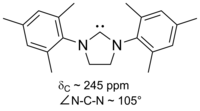
Photo from wikipedia
Plutonium has potential applications in energy production in well-controlled nuclear reactors. Since nuclear power plants have great merit as environmentally friendly energy sources with a recyclable system, a recycling system… Click to show full abstract
Plutonium has potential applications in energy production in well-controlled nuclear reactors. Since nuclear power plants have great merit as environmentally friendly energy sources with a recyclable system, a recycling system for extracting Pu from spent fuels using suitable extractants has been proposed. Pu leakage is a potential environmental hazard, hence the need for chemical sensor development. Both extractants and chemical sensors involve metal–ligand interactions and to develop efficient extractants and chemical sensors, structural information about Pu ligands must be obtained by quantum calculations. Herein, six representative nitrogen tridentate ligands were introduced, and their binding stabilities were evaluated. The tridentate L6, which contains tri-pyridine chelate with benzene connectors, showed the highest binding energies for Pu(IV) and PuO2(VI) in water. Analysis based on the quantum theory of atoms in molecular analysis, including natural population analysis and electron density studies, provided insight into the bonding characteristics for each structure. We propose that differences in ionic bonding characteristics account for the Pu-ligand stability differences. These results form a basis for designing novel extractants and organic Pu sensors.
Journal Title: International Journal of Molecular Sciences
Year Published: 2020
Link to full text (if available)
Share on Social Media: Sign Up to like & get
recommendations!